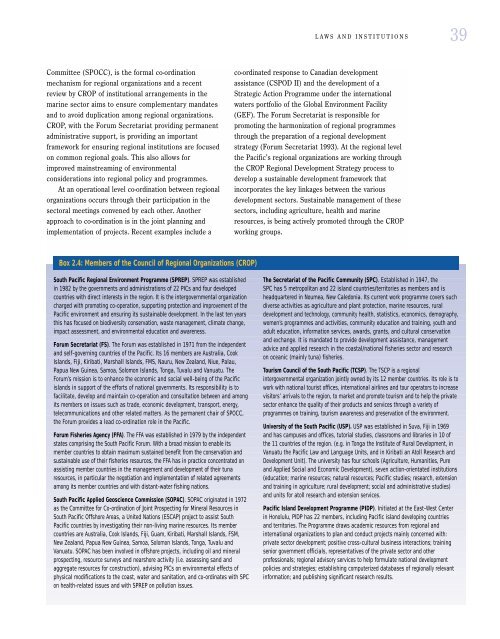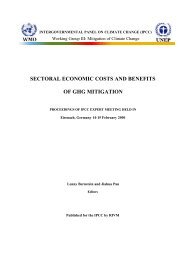Pacific Islands Environment Outlook - UNEP
Pacific Islands Environment Outlook - UNEP
Pacific Islands Environment Outlook - UNEP
You also want an ePaper? Increase the reach of your titles
YUMPU automatically turns print PDFs into web optimized ePapers that Google loves.
LAWS AND INSTITUTIONS 39<br />
Committee (SPOCC), is the formal co-ordination<br />
mechanism for regional organizations and a recent<br />
review by CROP of institutional arrangements in the<br />
marine sector aims to ensure complementary mandates<br />
and to avoid duplication among regional organizations.<br />
CROP, with the Forum Secretariat providing permanent<br />
administrative support, is providing an important<br />
framework for ensuring regional institutions are focused<br />
on common regional goals. This also allows for<br />
improved mainstreaming of environmental<br />
considerations into regional policy and programmes.<br />
At an operational level co-ordination between regional<br />
organizations occurs through their participation in the<br />
sectoral meetings convened by each other. Another<br />
approach to co-ordination is in the joint planning and<br />
implementation of projects. Recent examples include a<br />
co-ordinated response to Canadian development<br />
assistance (CSPOD II) and the development of a<br />
Strategic Action Programme under the international<br />
waters portfolio of the Global <strong>Environment</strong> Facility<br />
(GEF). The Forum Secretariat is responsible for<br />
promoting the harmonization of regional programmes<br />
through the preparation of a regional development<br />
strategy (Forum Secretariat 1993). At the regional level<br />
the <strong>Pacific</strong>’s regional organizations are working through<br />
the CROP Regional Development Strategy process to<br />
develop a sustainable development framework that<br />
incorporates the key linkages between the various<br />
development sectors. Sustainable management of these<br />
sectors, including agriculture, health and marine<br />
resources, is being actively promoted through the CROP<br />
working groups.<br />
Box 2.4: Members of the Council of Regional Organizations (CROP)<br />
South <strong>Pacific</strong> Regional <strong>Environment</strong> Programme (SPREP). SPREP was established<br />
in 1982 by the governments and administrations of 22 PICs and four developed<br />
countries with direct interests in the region. It is the intergovernmental organization<br />
charged with promoting co-operation, supporting protection and improvement of the<br />
<strong>Pacific</strong> environment and ensuring its sustainable development. In the last ten years<br />
this has focused on biodiversity conservation, waste management, climate change,<br />
impact assessment, and environmental education and awareness.<br />
Forum Secretariat (FS). The Forum was established in 1971 from the independent<br />
and self-governing countries of the <strong>Pacific</strong>. Its 16 members are Australia, Cook<br />
<strong>Islands</strong>, Fiji, Kiribati, Marshall <strong>Islands</strong>, FMS, Nauru, New Zealand, Niue, Palau,<br />
Papua New Guinea, Samoa, Solomon <strong>Islands</strong>, Tonga, Tuvalu and Vanuatu. The<br />
Forum’s mission is to enhance the economic and social well-being of the <strong>Pacific</strong><br />
islands in support of the efforts of national governments. Its responsibility is to<br />
facilitate, develop and maintain co-operation and consultation between and among<br />
its members on issues such as trade, economic development, transport, energy,<br />
telecommunications and other related matters. As the permanent chair of SPOCC,<br />
the Forum provides a lead co-ordination role in the <strong>Pacific</strong>.<br />
Forum Fisheries Agency (FFA). The FFA was established in 1979 by the independent<br />
states comprising the South <strong>Pacific</strong> Forum. With a broad mission to enable its<br />
member countries to obtain maximum sustained benefit from the conservation and<br />
sustainable use of their fisheries resources, the FFA has in practice concentrated on<br />
assisting member countries in the management and development of their tuna<br />
resources, in particular the negotiation and implementation of related agreements<br />
among its member countries and with distant-water fishing nations.<br />
South <strong>Pacific</strong> Applied Geoscience Commission (SOPAC). SOPAC originated in 1972<br />
as the Committee for Co-ordination of Joint Prospecting for Mineral Resources in<br />
South <strong>Pacific</strong> Offshore Areas, a United Nations (ESCAP) project to assist South<br />
<strong>Pacific</strong> countries by investigating their non-living marine resources. Its member<br />
countries are Australia, Cook <strong>Islands</strong>, Fiji, Guam, Kiribati, Marshall <strong>Islands</strong>, FSM,<br />
New Zealand, Papua New Guinea, Samoa, Solomon <strong>Islands</strong>, Tonga, Tuvalu and<br />
Vanuatu. SOPAC has been involved in offshore projects, including oil and mineral<br />
prospecting, resource surveys and nearshore activity (i.e. assessing sand and<br />
aggregate resources for construction), advising PICs on environmental effects of<br />
physical modifications to the coast, water and sanitation, and co-ordinates with SPC<br />
on health-related issues and with SPREP on pollution issues.<br />
The Secretariat of the <strong>Pacific</strong> Community (SPC). Established in 1947, the<br />
SPC has 5 metropolitan and 22 island countries/territories as members and is<br />
headquartered in Noumea, New Caledonia. Its current work programme covers such<br />
diverse activities as agriculture and plant protection, marine resources, rural<br />
development and technology, community health, statistics, economics, demography,<br />
women’s programmes and activities, community education and training, youth and<br />
adult education, information services, awards, grants, and cultural conservation<br />
and exchange. It is mandated to provide development assistance, management<br />
advice and applied research in the coastal/national fisheries sector and research<br />
on oceanic (mainly tuna) fisheries.<br />
Tourism Council of the South <strong>Pacific</strong> (TCSP). The TSCP is a regional<br />
intergovernmental organization jointly owned by its 12 member countries. Its role is to<br />
work with national tourist offices, international airlines and tour operators to increase<br />
visitors’ arrivals to the region, to market and promote tourism and to help the private<br />
sector enhance the quality of their products and services through a variety of<br />
programmes on training, tourism awareness and preservation of the environment.<br />
University of the South <strong>Pacific</strong> (USP). USP was established in Suva, Fiji in 1969<br />
and has campuses and offices, tutorial studies, classrooms and libraries in 10 of<br />
the 11 countries of the region. (e.g. in Tonga the Institute of Rural Development, in<br />
Vanuatu the <strong>Pacific</strong> Law and Language Units, and in Kiribati an Atoll Research and<br />
Development Unit). The university has four schools (Agriculture, Humanities, Pure<br />
and Applied Social and Economic Development), seven action-orientated institutions<br />
(education; marine resources; natural resources; <strong>Pacific</strong> studies; research, extension<br />
and training in agriculture; rural development; social and administrative studies)<br />
and units for atoll research and extension services.<br />
<strong>Pacific</strong> Island Development Programme (PIDP). Initiated at the East-West Center<br />
in Honolulu, PIDP has 22 members, including <strong>Pacific</strong> island developing countries<br />
and territories. The Programme draws academic resources from regional and<br />
international organizations to plan and conduct projects mainly concerned with:<br />
private sector development; positive cross-cultural business interactions; training<br />
senior government officials, representatives of the private sector and other<br />
professionals; regional advisory services to help formulate national development<br />
policies and strategies; establishing computerized databases of regionally relevant<br />
information; and publishing significant research results.

















